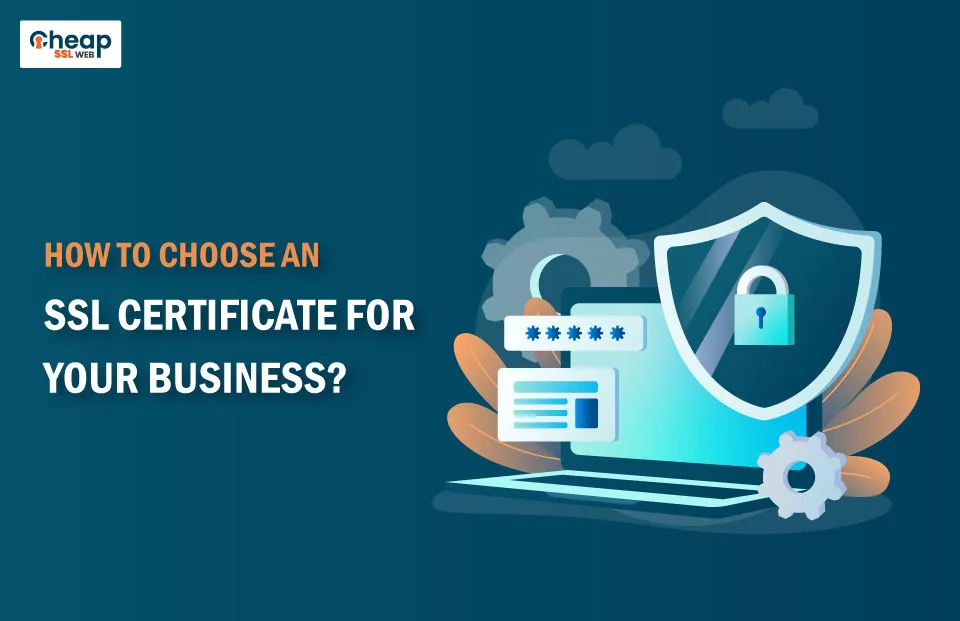Choosing Right SSL Certificate for Your Business

Choosing the right SSL certificate for your business can be challenging as there are “n” number of brands available that you can purchase SSL cert from, like DigiCert, SectigoSSL, RapidSSL, etc. Each of the brands provides different types of SSL certs, like DV (Domain Validated), OV (Organization Validated), or EV (Extended Validation).
Above that, these SSL certs can be further categorized based on the number of domains and subdomains they can secure, as in whether it’s a – single domain certificate, a wildcard, a multi-domain certificate, or a multi-domain SAN SSL certificate.
This is not all; each certificate comes with different features and whatnot. So, let me ask: “Is it wise to choose an SSL certificate for your business without proper consideration or incomplete knowledge?” The answer would be a big “No.” So, what factors should one look at when choosing an SSL certificate?
If you were finding the answer to the same query, you are at the right article. Here, we will be exploring the – “Top six factors that you should consider before choosing an SSL certificate for your business.” But before we start with that, it would be much better to be aware of SSL certificates and their importance.
What are SSL Certificates?
SSL certificates are small data files (a bit of code hosted within the webpage’s origin server) that digitally bind a cryptographic key to an association’s details. Trusted CA (Certificate Authority) issue these certificates after thorough validation and verification.
A website needs an SSL (a.k.a. TLS) certificate to activate the HTTPS protocol, enabling secure connections between web servers and clients’ browsers. When installed on a web server, an SSL certificate displays trust indicators like a padlock icon and an additional “S” in the URL address bar. This helps in boosting trust among website visitors.
To view an SSL certificate’s details, click on the padlock symbol in the browser bar. The following details mentioned below are typically included within SSL certificates:
- The public key
- Associated subdomains
- The expiry date of the certificate
- The issuance date of the certificate
- Which Certificate Authority issued it
- The Certificate Authority’s digital signature
- The domain name that the SSL cert was issued for
- Which individual, institution, or device it was issued to
Why are the SSL Certificates Important?
There are myriad benefits of using an SSL certificate. Here are Some of the most prevalent ones benefits of an SSL Certificate
- Improved Security: SSL encryption that gets enabled because of an SSL certificate shields (safeguards) websites and users from security threats, data breaches, identity theft, and other malicious activities.
- Enhanced SEO: Having an SSL certificate can help your website rank higher on search engines like Google, as they prefer websites with an SSL certificate.
- Improved User Trust: A website with an SSL certificate installed displays visible trust indicators like an additional “S” in the bar, a padlock icon, etc., which in turn helps in building the user’s trust.
- Compliance with Data Protection Regulations: SSL cert is paramount for GDPR, HIPAA, and PCI DSS compliance, as these regulations require strict security measures for handling sensitive data.
Top Six Factors That You Must Consider When Selecting an SSL Certificate for Your Business
Following are the top six factors that you must consider before choosing an SSL certificate for business:
- Number of Domains and Subdomains that the SSL Certificate is able to secure
- The validation level of the SSL Cert
- Cost
- Brand
- Warranty Amount
- Customer Support
First, we will prioritize the most important factor and continue in descending order.
Number of Domains and Subdomains that the SSL Certificate is able to secure
The first and foremost thing you should look for is the number of domains and subdomains the certificate you select can secure. A Single-Domain SSL certificate is able to secure a single domain or subdomain (both the versions – www and non-www). A Multi-Domain SSL certificate can secure multiple primary domains and also allows you to add, update, and remove additional SANs up to 247.
A Wildcard SSL Certificate is able to secure a single domain (FQDN) along with its unlimited number of associated subdomains. A Multi-Domain Wildcard can secure up to 250 multiple websites and their sub-domains.
In lay terms, choose the SSL certificate per the number of domains or subdomains you need to secure. Select the SSL certificate that best suits your needs and move forward on the second factor.
The validation level of the SSL Cert
The second factor you must consider is the validation level of the SSL certificate. The higher the validation level, the more trust visitors will have in your website’s security. They will feel confident while entering confidential information like – credit card numbers, social security numbers, etc. Therefore, choose your validation level wisely. You can choose any one of these validation levels:
Domain validated (DV): DV SSL certificates provide elemental protection with no visual indications (signals) and no ties to your organization. Domain-validated SSL certificates are perfect for those on a budget or with basic websites that don’t collect personal information.
The issuance time required to get these SSL certs is the lowest; CA can issue this certificates within few minutes. To get this level of validation, you just have to prove the domain ownership. Out of these three methods mentioned below, you can choose any one to accomplish the same:
- E-mail based verification
- DNS (CNAME/TXT) based verification
- File-based verification
Organization validated (OV): OV SSL certificates are issued after a cursory review in which the existence of the institution requesting the certificate and the ownership of the domain name is verified.
Generally CA issues this type of SSL Certificates is 2-3 working days. This level of validation builds a moderate level of trust among the visitors visiting the website. The OV-validated SSL certs are best for public-facing websites that deal with less sensitive data from the users. To get an OV certificate, you must fulfill these validation requirements:
- Organization authentication
- Domain verification
- Locality presence
- Final verification call
You can also submit a Public Opinion Letter to fulfill the validation requirements, but it cannot verify the domain name.
Extended validated (EV): SSL certificates with EV validation provide the most visual signals and the highest level of trust and can only be obtained after a thorough verification and validation process. Organizations that opt for an EV validated SSL certificate are mostly e-commerce companies, financial institutes, etc., that have to store customers’ confidential data.
Typically CA issues EV SSL Certificates in 5-7 working days. To get this level of certificate, you must fulfill these validation requirements:
- Enrollment Forms
- Organization Authentication
- Operational Existence
- Domain Authentication
- Employment and Authority
- Final Verification Call
It is recommended to choose high level trust EV SSL Certificate, If you value your customers’ trust and want to ensure their safety However, if your industry doesn’t require a high level of trust, and a moderate level is enough, then you may not need to invest in expensive certificates and can opt for a DV or OV certificate instead. The key point here is to choose the right trust level of SSL certificates that match the required trust level required for your industry.
Cost
The next factor that must be considered is the – “Cost.” The price of an SSL certificate is somewhat directly proportional to the certificate’s validation level and the number of domains and subdomains it can secure.
To get a clear picture, go through the tables shown below:
Single-Domain SSL Certificates
| Name | Validation Level | Cost ($/yr) |
| Certera SSL Certificate | DV | 2.99 |
| Comodo Instant SSL Certificate | OV | 21.99 |
| Comodo PositiveSSL EV Certificate | EV | 59.99 |
Multi-Domain SSL Certificates
| Name | Validation Level | Cost ($/yr) |
| Certera Multi Domain SSL Certificate | DV | 10.99 |
| Comodo PositiveSSL OV Multi-Domain | OV | 50.00 |
| Comodo Positive EV Multi-Domain | EV | 109.99 |
Wildcard SSL Certificates
| Name | Validation Level | Cost ($/yr) |
| Certera SSL Wildcard Certificate | DV | 19.99 |
| Comodo PositiveSSL OV Wildcard | OV | 80.00 |
Note: EV Wildcard SSL certificates are not available.
Choose a suitable SSL certificate that fits your budget. It is not necessary to purchase a certificate that exceeds your needs or the one that makes a hole in your pocket. Buying a certificate that cannot protect your website is also not feasible and will be a waste of money. Therefore, align your budget with the most suitable SSL certificate.
Brand
The subsequent factor to consider is the brand. As there are “n” number of brands available in the market, choosing one can become quite challenging. So, how to choose? To make the best choice, you should look at the reputation and market share of the CA, as well as its recent history.
Some of the most trusted providers that you can go for are:
- Sectigo
- Symantec
- DigiCert
- Certera
- GeoTrust
- Thawte
- Comodo
- EnterpriseSSL, etc.
Remember, your chosen brand can affect the validation level, warranty amount, and the dynamic or static site seal that is displayed on your website.
Warranty Amount
While SSL certificates come with advanced encryption standards such as the 256-bit and 2048-bit RSA algorithms, it is advisable to choose the ones that offer a modest warranty to avoid any risks of mis-issuance. In case of a breach of SSL encryption resulting in financial loss for the customer, the website owner may be held liable.
The SSL warranty can help in such situations as it may cover the costs of damages and legal fees. However, it’s worth noting that SSL certificates with a higher warranty are much more costly than those offering a moderate warranty amount.
Customer Support
We often overlook customer support of vendor when purchasing an SSL Certificate. If you face any issues during installation or usage, having access to reliable customer support can make all the difference. But, unfortunately – not all customer support is equal.
Some may not be available when you need them, use a different communication medium from the one you prefer, or lack the required expertise. To avoid seeing yourself in such a position, it’s important to research the seller or re-seller from whom you plan to purchase the SSL certificate.
To accomplish the same, check the reviews, especially the ones that mention the customer support offered. Apart from examining the comments, do exhaustive research at your end and select a provider with positive feedback to ensure reliable support.
Where to Buy SSL Certificates From?
The cheapsslweb.com is the best place to buy SSL certificates from. The websites have all types of SSL certs, and that too at the cheapest rate in comparison to any other seller or re-seller present out there in the market.
CheapSSLWeb is not only known for selling SSL certificates at the lowest price, but it is also popular among website owners for its 24*7 support comprising of dedicated professionals who have decades of experience working with SSL and are eager to help you through your preferred communication medium, whether it online chat, virtual meetings, phone calls, etc.
Conclusion
SSL is not a – “one-size-fits-all” type of digital product or solution, so choosing one without analyzing or comprehending your website’s needs would be wrong. Therefore, analyze your website needs, consider the factors that we discussed above, and ask yourself these three questions mentioned below before making a final decision:
- What’s the number of domains and subdomains that I want to secure?
- What validation level do I need?
- What is my budget?
